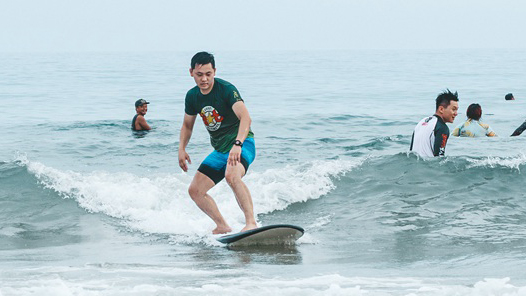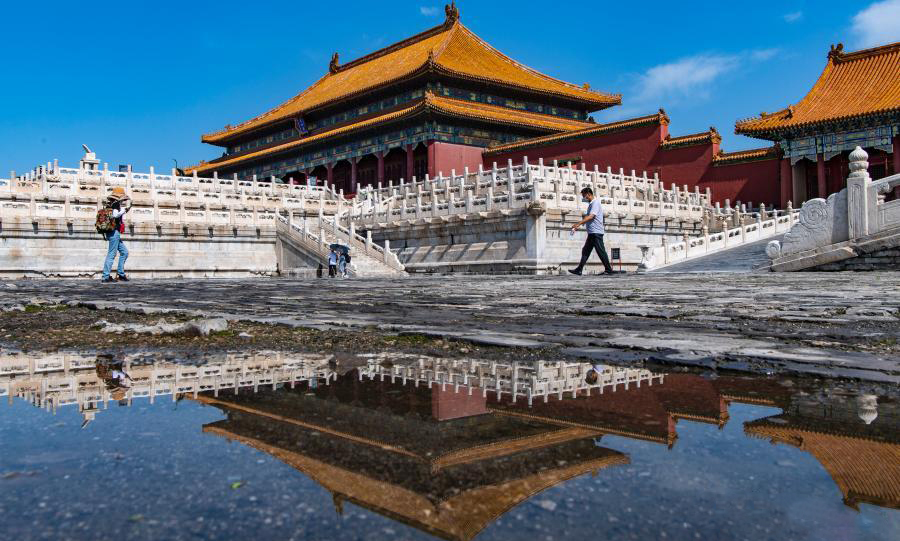Feature: Ten-year dream comes true for China's long jumper Wang
EUGENE, United States, July 18 (Xinhua) -- Wang Jianan vividly remembered that he had dreamed to win the world title for three times, with the latest one happening this year. Every time he woke up, he would tell himself to be realistic.
Now the dream is no longer an unrealistic delusion. The 25-year-old on Saturday stunned the field here with an effort of 8.36 meters, grabbing China's first ever long jump gold medal at the World Athletics Championships.
Since competing at the national level for the first time in 2012, Wang has steadily built himself up to the world's elite in the span of a decade.
FROM COMBINED TO LONG JUMP
Born on August 27, 1996, in Shenyang, northeast China's Liaoning province, Wang started training in the pole vault and combined events when he was nine. His first coach Yang Keqiang remembered him as "having a special temperament."
"I first saw him in our district's sports meeting for middle and elementary school students," Yang recalled. "He didn't take any medals, but he struck me as a potential athlete as he had longer legs compared to his peers."
Five years later, Wang was selected into the athletics team of Xuzhou, Jiangsu province, and started to compete for Jiangsu nationally in 2012 when he earned his first national title in the heptathlon at the national indoor Grand Prix.
During that early phase, the young athlete didn't know precisely where his specialty lay. He just practiced everything a decathlon professional needs to master, a typical training method for young athletes in many track and field powerhouses.
Soon, however, he found his own breakthrough direction.
"I jumped 7.80 meters once in a combined competition, and my coach told me to quit the combined to focus on the long jump. That was how I started my long jump career," said Wang in a previous interview.
One month after turning 16, he jumped a personal best of 8.04 meters to claim the national title. It was the first time that he had ever jumped over eight meters.
FROM ROOKIE TO ELITE
2013 marked another turning point for Wang, who represented China in the Asian Championships held in Balewadi, Pune, India. After winning the long jump title with 7.95 meters, he got a ticket to the 2013 World Championships in Moscow without even competing in the World Junior Championships.
But the young champion paid the price in Moscow, where he failed to surpass 7.60 meters in all his three attempts in the qualification.
"It was truly disastrous for him," said Feng Shuyong, the then head coach for Team China. "But he also accumulated experiences for major contests," Feng added.
The long jump competitions allow for few errors as only three chances are given to each jumper in the qualification rounds at significant events such as the World Championships and the Olympics. Some elites could produce poor results when competing even if they always perform well during training.
The "Waterloo" in Moscow made Wang realize the importance of stability during competitions. Working with coach Randy Huntington, who also coached Chinese star sprinter Su Bingtian, Wang steadily improved his mentality as well as his technique.
In 2014, the young jumper proved himself just one month before turning 18, nailing the gold with 8.08 meters in the World Junior Championships in Eugene.
Around a year later, he rewrote history by claiming the bronze with 8.18 meters in the 2015 World Championships in Beijing, becoming the first ever medalist in men's long jump in Asia. In 2018, he jumped a personal best of 8.47 meters and tied the national record held by Li Jinzhe. His performances steadily remained above 8.20 meters in major national and international contests.
He has been waiting for another breakthrough.
ON TOP OF THE WORLD
The world men's long jump has seen significant development since 2015. Jumpers from the U.S., South Africa, Cuba and Greece have emerged with performances over 8.50 meters, which pose challenges for Wang and his compatriots to make it to the podium.
At the 2016 Rio Olympics, Wang ranked fifth with 8.17 meters. He then improved the result by 0.06 meters and ended up in seventh place in the London World Championships in 2017. Two years after London, he came sixth with 8.20 meters in Doha world championships.
At the Tokyo Olympics, he didn't even get into the finals.
"The Olympics last year was a big fall, so after Tokyo, I have always kept something I used during the games with me," said Wang. "Some people don't understand why I've been doing that because they think it's bad luck, but for me, those things are the reminders of the lessons I should learn from," he added.
Eight years have passed since the last time he won gold at the Hayward Field; this time, he didn't let his chance slip.
Before the last jump on Saturday, Wang ranked fifth with 8.03 meters. The reigning Olympic champion Miltiadis Tentoglou from Greece was in first place with 8.32 meters.
"I looked at the screen before my last attempt, and I felt 8.15 meters would be enough for a medal," said Wang after the competition. "So I thought I would just jump with my eyes closed and with my head raised up. I believed I could take a medal home."
At the starting area of the runway, the composed jumper didn't ask for applause from the audience as he did in the previous jumps. Instead, he just took a deep breath and began his last attempt.
He ran, he took off, and he glided into the air before landing beyond the mark of 8 meters.
"I stood up and looked back into the pit; I knew it was around 8.30 meters. It was either a gold or a medal. So I just ran forward, subconsciously," the jumper recalled the moment of joy before his final result was out.
And then, 8.36 meters! When the number appeared on the screen, Wang finally stopped running, squatted down and covered his face with his hands.
"I cried indeed. I was so emotional," he said afterward.
No one was able to pull out a better jump.
After the ceremony, the new champion soon restored his usual calm.
"My plan for the next two years is still to move forward steadily," said Wang, revealing that he wouldn't set hard-to-achieve goals for the upcoming World Championships or the Olympics.
"I just want to train hard and to do my best," he added.
Photos
Related Stories
Copyright © 2022 People's Daily Online. All Rights Reserved.









